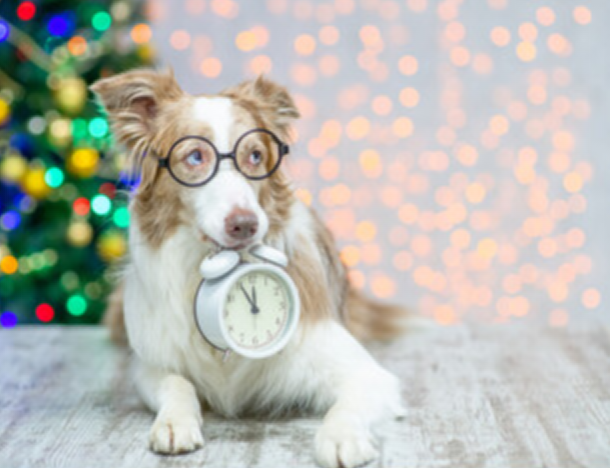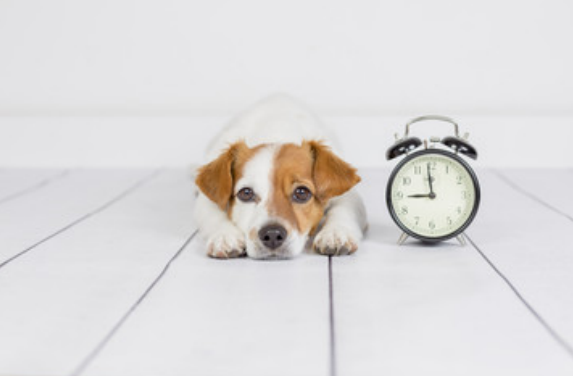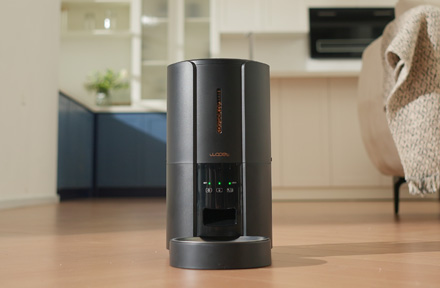May 15, 2025
Author:Amanda Lyu
Do Dogs Understand Time? It’s a question many dog owners ask, especially when your pup is already sitting by the door just minutes before you walk in. There’s no clock on the wall for your dog, yet they stick to routines like pros. So, do dogs know time, or is it just a habit?
Dogs don’t know time like humans do, but their actions tell a strong tale of routine. Sometimes they wake up, eat at a certain time, or wait by the window exactly at that specific time. There are no happenings, and inner clocks cause them, smells, and cues each day.
Still, one of the biggest mysteries remains: how do dogs know when you’re home? From fading scents to environmental sounds, science shows dogs are much more aware of timing than we once thought. Let’s break down the science behind your dog’s inner schedule and discover what they understand about time.

Has your dog ever been awake at the same time of day or hung out by their bowl waiting for dinnertime? It should make you think: Do dogs even know time? Correct, they don't keep track of hours or minutes but rely heavily on a strong internal system regulating their routine.
The rhythm over 24 hours, as in the case of all organisms, is influenced heavily by light, temperature, and habits, and it tells them when to eat, when to sleep, and when to play. That is why many dogs tend to be sleepy during the nighttime, and in the morning, they tend to be awake.
Dogs also use environmental cues such as sound, light, and scent to build up their perception of time. As your smell fades during the day, it may indicate to them how long you have been gone.
So, do dogs have a sense of time? Yes—but it’s based on routine and changes around them, not by counting hours. Tools like automatic pet feeders help match their natural timing and support consistent care.
How do dogs know when you’re home? This is perhaps the most commonly asked question for dog parents; there's no call, no time set, but already their dog is wagging its tail at the door. This behaviour isn’t magic. It’s based on memory, habit, and a powerful sense of smell.
Dogs are routine animals. It takes time for them to understand and absorb your patterns, know in the morning when you leave, when you return, and even how long you've been away. These patterns help build their sense of timing. One major clue is scent. As the day passes, your scent fades from the home. Some experts believe your dog uses that fading scent as a “clock” to track how long you’ve been away.
This mix of scent and habit builds your dog’s awareness. It’s part of how dogs know time, even without understanding clocks. It also ties into dog perception of time—how they link events based on order and duration.
Many pet owners use WOpet Smart Pet Cameras to check in during the day. What’s amazing is how often dogs are found waiting by the door moments before their human walks in. It shows how tuned-in they are, not just to the time of day but to everything around them.
So, do dogs understand time in this way? Yes, through repeated exposure and scent cues. They learn your routine so well that they often know when you’re coming home before you do.
Humans use clocks and calendars to manage time. Dogs rely on memory, routine, and environmental changes. This difference shapes the entire dog perception of time.
Generally, dogs have short-term memories that span from a few minutes to several hours unless extreme emotion or habit attaches to the cause or the object. For instance, the dog cannot locate a dropped piece of food if it does not see where the treat landed, so the dog may forget about it very quickly. Whereas long-term conditioning, such as daily walking for the dog, is much easier to learn and remember.
So, how do dogs process minutes vs hours? They don’t measure time like we do, but they understand sequences. They associate your actions with outcomes. For instance, picking up keys might mean you're leaving. Putting on shoes might mean a walk. Over time, dogs link these actions to what follows.
A study published in Applied Animal Behaviour Science found that dogs showed more excitement after being left alone for two hours than 30 minutes, suggesting they can sense the duration of time.
So, what about a dog's ability to sense time? Surely they do, but it is all based on patterns and emotional cues rather than numbers or clocks. This instinctual ability is crucial to how a dog feels time and responds to daily happenings. And that understanding allows us to treat our dogs better, especially concerning food and comfort routines.

A dog's daily rhythm is affected by so many factors: age, breed, and routine are among them. Dogs know when to eat, walk, or lie down, even without seeing the clock. So, do dogs have a sense of time? In their understanding, they do.
Some puppies are still learning, and there is probably not much in memory for senior dogs since they have aged. The routine-oriented breeds, like Border Collies or German Shepherds, are also much faster at picking up the schedule.
Feeding and walking times are key cues. If dinner is usually at 6 p.m., expect pacing or bowl-staring if you're late. Walk time? They might bring the leash or wait by the door.
Tools like automatic pet feeders keep routines steady, even on busy days. It supports a dog’s sense of structure and lowers stress.
Dog perception of time is built through patterns. With a constant routine, dogs know what's next, one habit at a time.
Every dog has its own sense of time, even if that dog may not know what time is. Understanding what it means to stick to a schedule for certain dogs goes beyond obedience training. Schedules also affect each dog's body, mind, and environment. However, if you ask if dogs have a sense of time, the answer would probably vary with the activities for that specific day in the dog's calendar.
These are the most important factors for shaping that dog's sense of time.
Do dogs understand time in the same way at every age? Not really. Puppies are still learning and have little routine. Senior dogs may lose time awareness as they age. Breed matters too—working dogs like Border Collies often follow routines very closely.
Dogs build their schedule through repeated actions. Meals, walks, and playtime help form a pattern. Once set, they start to expect it. Delay one, and a bark or stare might remind you.
Feeding is a strong time cue for dogs. Serving meals at the same time daily helps their internal clock. Using automatic pet feeders keeps things on track—even when life gets busy.
Do dogs have a sense of time? Yes—but it’s shaped by habit, not hours. A stable routine helps dogs feel safe and know what comes next. That’s how dogs know time—through rhythm and care.
Yes, absolutely. But dogs do not understand time as we do. Nevertheless, they do rely on consistent daily routines. A dog would be trained to anticipate events when the same actions are performed consistently at the same time every day. Over time, they’ll expect meals, walks, and bedtime based on patterns, not the clock.
Start with small steps. Feed your dog at consistent times every day. Walk them around the same hours. Set a regular bedtime. These daily habits create strong mental associations that help your dog feel safe and well-balanced.
Tools like the WOpet Smart Feeders make this even easier. They serve meals on time, every time—even when you're away. This stabilises your dog's feeding schedule and helps reinforce their inner rhythm.
So, do dogs have a sense of time strong enough for training? Yes—if it’s built through structure and repetition. Routine builds trust, reduces stress, and even improves behaviour.
For more ways to shape your dog’s habits, check out our dog training tips on creating consistent schedules. Understanding how dogs know time will help you train smarter and make daily life easier.
Creating a proper dog routine involves much more than feeding and walking. It is about creating a life for the dog that is full of structure, comfort, and consistency. So, do dogs understand time? Yes, especially when provided with a reliable schedule.
Here are some simple ways to support your dog’s routine.
Dogs do very well with routines. There should be a feeding time that is the same every day, with the walking and rest times in between. This helps raise the dog's awareness of time and maintain a balance between body and mind.
The day can be packed with activities; overload them with some play and allow quiet periods for rest. When expectations are set, transitions from activities to relaxation will be easier.
For additional tips on creating a healthy routine, check out the WOpet dog care tips. Creating a structure provides security for a dog. That’s how dogs know time—not by clocks, but through the routines and care given daily.

Pet parents trust WOpet for smart solutions to facilitate caring for pets. From smart feeders that ensure pets get their meals on time to advanced pet cameras that keep an eye on the pets when parents are away, WOpet's innovative, state-of-the-art products make every day that much better.
These smart solutions are designed to enhance routine, comfort the pet, and minimise anxiety for the pet's well-being. With WOpet's customer support and focus on technology, pet parents can be comfortable about where their pets are.
Dogs know time, but they perceive it differently from how humans do. Unlike humans, who use mechanical devices to measure their time, dogs also measure time through biological rhythms, daily routines, and sensory signals. Most repetitions and interlacing of these feeding, walking, and sleeping patterns shape a dog's perception of time. Age and breed are also factors that can influence perception of time, but all types of dogs tend to do well with routine.
Therefore, the answer to the question: Do dogs know about Time? Yes, but they know it through habits and schedules, not the ticking clock. Routines help give the dogs a sense of security and balance.
For pet parents looking to create a seamless daily routine, check out WOpet for smart solutions to support pet care. Visit the site today to discover products that make life easier for pets and their families.
Label:
Popular Post

What to Feed a Sick Dog With No Appetite? [2025 Guide]
May 16, 2023

Troubleshooting Common Issues with Automatic Pet Feeders: Tips & Tricks for Pet Owners
Oct 26, 2023

Why Does My Cat Cough After Drinking Water? 8 Potential Reasons
Mar 13, 2023

My Cat Only Eats A Little at A Time - What to Do?
Feb 27, 2023

Why is My Cat Throwing up Water? Top 5 Causes Here
Feb 08, 2023
$99.99
$129.99
Copyright © 2025 WOPET. All Rights Reserved.